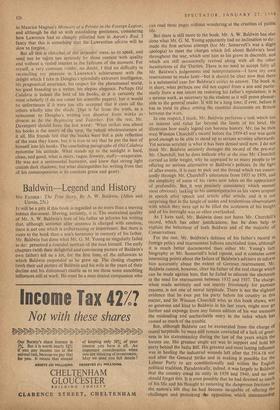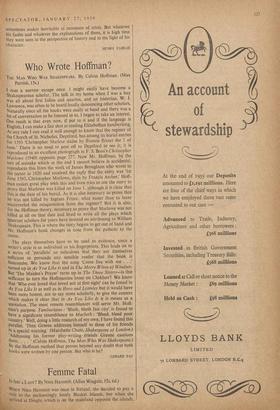Baldwin—Legend and History
1-r will be a pity if this book is regarded as no more than a moving human document. Moving, certainly, it is. The unstrained quality of Mr. A. W. Baldwin's love of his father so informs his writing that, although sentence after sentence is charged with emotion, there is not one which is embarrassing or impertinent. But there is more to the book than a son's testimony in memory of his father. Mr. Baldwin has done what Mr. G. M. Young so singularly failed to do: presented a rounded portrait of the man himself. The early chapters (with their delightful and convincing picture of Baldwin's own father) tell us a lot, for the first time, of the influences to which Baldwin responded as he grew up. The closing chapters (with their sad picture of Baldwin and his wife in the years of their decline and his dishonour) enable us to see those same ennobling influences still at work. He must be a man denied compassion who can read these pages without wondering at the cruelties of public life.
But there is still more to the book. Mr. A. W. Baldwin has also done what Mr. G. M. Young apparently had no inclination to do: made the first serious attempt (for Mr. Somervell's was a slight apologia) to meet the charges which fell about Baldwin's head throughout the war, which sent him to his grave in discredit, and which are still occasionally revived alcing with all the other incantations of the Thirties. There is no need to accept fully all Mr. Baldwin's judgements and interpretations-1 have my own
reservations to make later—but it should he clear now that there is a substantial case for Baldwin's critics to answer. The book is, in short, what perhaps one did not expect from a son and partic- ularly from a son intent on restoring his father's reputation; it is a serious work, as necessary to, the student as it will prove pleasur- able to the general' reader. It will be a long time, if ever, before it has to yield its place among the essential documents on Britain between the wars.
In one respect, I think, Mr. Baldwin performs a task which has an interest and value far beyond the, limits of his brief. He illustrates how easily legend can become history. M r. (as he then was) Winston Churchill's record before the 1939-45 war was quite good enough to be able to stand up to serious scrutiny afterwards. Yet serious scrutiny is what it has been denied until now. I do not think Mr. Baldwin seriously damages the record of the pre-war Mr. Churchill, but he does indicate why at the time Mr. Churchill carried so little weight, why he appeared to so many people to be offering no serious alternative to Baldwin's policies. In the light of after-events, it is easy to pick out the thread which ran consis- tently through Mr. Churchill's utterances from 1933 to 1939, and the simplicity of some of his views now takes on the appearance of profundity. But ,it was precisely consistency which seemed most obviously lacking to his contemporaries as his views erupted in speech after speech and article after article, and it is not surprising that in the tangle of asides and tendentious observations with which they were apt to be filled the acuteness of his insight and of his foresight was so often overlooked.
As 1 have said, Mr. Baldwin does not harm Mr. Churchill's record, which has other justifications; but he does help to explain the behaviour of both Baldwin and of the majority of Conservatives.
For the rest, Mr. Baldwin's defence of his father's record in foreign policy and rearmament follows established lines, although it is much better documented than either Mr. Young's lazy biography or Mr. Somervell's brief riposte, and it contains some interesting points about the failure of Baldwin's advisers to inform him accurately about the extent of German rearmament. Mr. Baldwin cannot, however, clear his father of the real charge which can be made against him, that he failed to educate the electorate in the need for rearmament between 1932 and 1937. The charge, when made seriously and not merely frivolously for partisan reasons, is not one of moral turpitude. There is not the slightest evidence that he ever put his party before his country in this matter, and Sir Winston Churchill who, as this book shows, was so generous and kind to Baldwin in his last years, might now go further and expunge from any future edition of his war memoirs the misleading and uncharitable entry in the index which has caused so much of the trouble.
But, although Baldwin can be exonerated from the charge of
moral he must still remain convicted of a lack of great- ness in his statesmanship during the last of the years which the locusts ate. His greatest single act was to support and hold his party behind the India Bill. His greatest and most lasting influence was in healing the industrial wounds left after the 1914-18 war and after the General Strike and in making it possible for the Labour Party to act constitutionally and within the English political tradition. Paradoxically, indeed, it was largely to Baldwin that the country owed its unity in 1939 and 1940, and no one should forget this. It is even possible that he had devoted so much of his life and his thought to removing the dangerous frictions in the nation's life that he had become incapable of offering the challenges and provoking the opposition which statesmanship
sometimes makes inevitable at moments of crisis. But whatever his faults and whatever the explanations of them, it is high time they were seen in the perspective of history and in the light of his character.
HENRY FAIRLIE











































 Previous page
Previous page